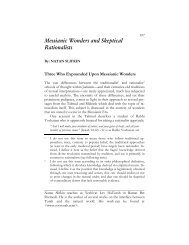Is There a Disconnect between Torah Learning and ... - Hakirah.org
Is There a Disconnect between Torah Learning and ... - Hakirah.org
Is There a Disconnect between Torah Learning and ... - Hakirah.org
You also want an ePaper? Increase the reach of your titles
YUMPU automatically turns print PDFs into web optimized ePapers that Google loves.
יז)(<br />
<strong>Is</strong> there a <strong>Disconnect</strong> <strong>between</strong> <strong>Torah</strong> <strong>Learning</strong> <strong>and</strong> <strong>Torah</strong> Living? : 43<br />
pointed out to the students that they had not mentioned even one<br />
Most students recognized this as a valid !מצוה שבין אדם לחבירו<br />
criticism. But one actually argued with me that the omission was<br />
מצוות שבין אדם via קדוש correct, because one does not become<br />
,קדושה she argued, is a result of ,מצוות in such זהירות Proper .לחבירו<br />
but not its creator.<br />
Yes, מצוות שבין אדם לחבירו do not have the aura of קדושה that<br />
some other rituals carry. Helping another person does not make us<br />
feel frum. Children have not seen or felt that the adults around them<br />
invested these activities with קדושה <strong>and</strong> rated them as being holy,<br />
Such an attitude stems from gross ignorance <strong>and</strong> a total lack of .קדוש<br />
underst<strong>and</strong>ing of <strong>Torah</strong> <strong>and</strong> of what קדושה means. After all, when the<br />
tells us to “cleanse” ourselves, he does not advise us to engage in נביא<br />
) 45 name: rituals, rather he says, in G-d’s בין אדם למקום<br />
טז) רַחֲצוּ הִזַּכּוּ הָסִירוּ רֹעַ מַעַלְלֵיכֶם מִנֶּגֶד עֵינָי חִדְלוּ הָרֵ ַע:<br />
דִּרְשׁוּ מִשְׁפָּט אַשְּׁ רוּ חָמוֹץ שִׁפְטוּ יָתוֹם רִיבוּ אַלְמָנָה:<br />
לִמְדוּ הֵיטֵב<br />
16. Wash, cleanse yourselves, remove the evil of your deeds from<br />
before My eyes, cease to do evil. 17. Learn to do good, seek justice,<br />
strengthen the robbed, perform justice for the orphan, plead the<br />
case of the widow.<br />
This is, thus, by no means a new or modern phenomenon. As we<br />
.נביאים see from the above posuk, it was a problem in the days of the<br />
It continued as a problem in the Second Bais HaMikdosh.<br />
The Gemara in Pesachim 85a tells us that פיגול (a sacrificed animal<br />
that had been invalidated because the Kohen had the wrong intent<br />
מטמא את was declared by the Rabbis to be ,(עבודה while doing the<br />
to defile the h<strong>and</strong>s of the Kohen who touched it. The Gemara ,הידים<br />
explains that, according to one opinion, this was done because some<br />
Kohanim were suspected of deliberately invalidating the sacrifices<br />
brought by people they didn’t like, thus damaging them monetarily<br />
(since the damaged party would now have to bring a replacement<br />
sacrifice). It was hoped that declaring the h<strong>and</strong>s of the offending<br />
Kohen ritually impure <strong>and</strong> requiring immersion in a Mikvah would<br />
prevent Kohanim from deliberately damaging their enemies in this<br />
way. Tosfos ask, if these Kohanim were suspected of damaging the<br />
.ספר ישעיה פרק א 45
















